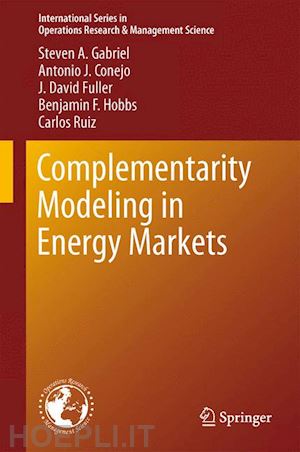
Questo prodotto usufruisce delle SPEDIZIONI GRATIS
selezionando l'opzione Corriere Veloce in fase di ordine.
Pagabile anche con Carta della cultura giovani e del merito, 18App Bonus Cultura e Carta del Docente
Steven A. Gabriel received his M.A. and Ph.D. degrees in Mathematical Sciences from Johns Hopkins University in 1989 and 1992, respectively, and his M.S. in Operations Research from Stanford University in 1984. He is currently Associate Professor, Civil Systems Program, Department of Civil and Environmental Engineering, University of Maryland.
Antonio J. Conejo received the M.S. degree from Massachusetts Institute of Technology, Cambridge, MA, in 1987 and the Ph.D. degree from the Royal Institute of Technology, Stockholm, Sweden, in 1990. He is currently Professor of Electrical Engineering at the Universidad de Castilla – La Mancha, Ciudad Real, Spain.
J. David Fuller received his Ph.D. in Interdisciplinary Studies from the University of British Columbia in 1980. His research interests focus on Energy Economics and Operations Research; Mathematical Programming Models of Economic Equilibrium with Applications to Energy Markets Forecasting and Electricity Market Design; and Decomposition of Linear, Nonlinear and Equilibrium Programs. He is currently a Professor of Management Sciences, in the Faculty of Engineering at the University of Waterloo, in Waterloo, Ontario, Canada.
Benjamin F. Hobbs received his Ph.D. in Environmental Systems Engineering from Cornell University in 1983; his MS in Resource Management and Policy from Syracuse University in 1978, and his BS in Mathematics and Environmental Sciences from North Dakota State University in 1976. He has served as Chair of the JHU President’s Climate Change Task Force since 2008.
Carlos Ruiz is currently a Ph.D. candidate under Dr. Conejo at the University de Castilla.











Il sito utilizza cookie ed altri strumenti di tracciamento che raccolgono informazioni dal dispositivo dell’utente. Oltre ai cookie tecnici ed analitici aggregati, strettamente necessari per il funzionamento di questo sito web, previo consenso dell’utente possono essere installati cookie di profilazione e marketing e cookie dei social media. Cliccando su “Accetto tutti i cookie” saranno attivate tutte le categorie di cookie. Per accettare solo deterninate categorie di cookie, cliccare invece su “Impostazioni cookie”. Chiudendo il banner o continuando a navigare saranno installati solo cookie tecnici. Per maggiori dettagli, consultare la Cookie Policy.